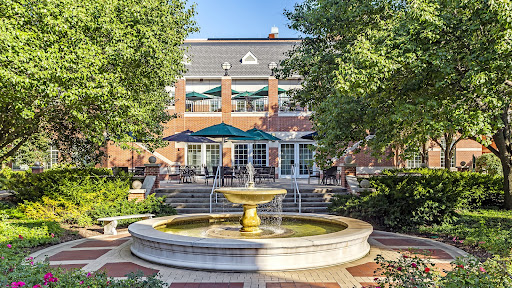Memory Care vs. Assisted Living: 5 Key Differences

If you’re helping your loved one find a senior living community where they can receive care, you may find that certain communities offer different levels of care. You may see residences designated for Memory Care and Assisted Living. While both levels of care support residents, they have five key differences that make them distinct from one another.
Knowing what differentiates memory care vs. assisted living can help you understand what kind of care would benefit your loved one the most.
Benefits of Memory Care
A physician will be the one to recommend Memory Care if they believe that’s in your loved one’s best interests. If your loved one has a form of dementia or cognitive impairments, then Memory Care may provide them with the personal care they need to thrive.
The staff has specific training on how to serve residents in Memory Care best. Services include:
- A specialized care plan for each resident
- Three daily meals
- Transportation
- Medication support
- Home maintenance
- Housekeeping
While Memory Care services cover the essentials, they also take your loved one’s well-being into account. This means providing programming that keeps your loved one engaged, and helping them find joy in each day. Thoughtful and intentional activities that can help your loved one flourish include:
- Going for a walk in a secure sensory garden
- Social programs and activities that include interaction and mental stimulation
- A calm dining environment with choices available for residents
Having a dynamic schedule with easy transitions will help your loved one flow from activity to activity, and staff can note which ones your loved one likes the most and incorporate it into their routine regularly.
Benefits of Assisted Living
Assisted Living can support your loved one with accomplishing vital daily tasks – activities of daily living – so they can live a full and healthy life in their assisted living residence.
Common ADLs include:
- Ambulating (this includes walking, sitting, and standing up)
- Getting dressed in weather-appropriate clothing
- Maintaining a hygienic routine (bathing, grooming)
- Using the restroom
- Eating
Care in Assisted Living focuses on helping your loved one maintain autonomy in every way possible. Your loved one may require assistance walking from place to place, but have no issues choosing their outfits or eating a meal. Their personalized care plan will consider what they need help with and how to best support them.
Residents in assisted living communities also have access to services and amenities that provide them with a maintenance-free, wellness-focused, and social lifestyle. They receive:
- Housekeeping services
- Three chef-prepared meals per day
- Access to formal gardens and walking paths
- Programming that benefits physical health and mental health
- Fun social activities
- Daily wellness checks
In this type of community, your loved one can live on their own with the comforting knowledge that help and support are available should they need it.

What’s the Right Option for Your Loved One: Five Key Differences
Finding the right option for your loved one can be a heavy decision, especially when you’ve been your loved one’s primary caregiver. It’s important to remember that a senior living community can give your loved one a life filled with ease, access to care, and enjoyment.
To find the right option, keep these five key differences in Memory Care vs Assisted Living in mind:
1. Moving to Memory Care Is a Clinical Decision
You may not have a decision between assisted living vs memory care. When your loved one has memory loss or other cognitive issues related to dementia, you may have some options depending on if it’s in the early stages. However, it’s common for your loved one’s physician to make the clinical decision that your loved one needs Memory Care.
2. Amenities and Programming
If you live in Assisted Living, you’ll have access to all kinds of amenities. Residents in Assisted Living choose what activities they want to do and what clubs they want to join – their days aren’t as planned out compared to the daily programming in Memory Care.
Memory Care residents receive programming that’s meant to engage their minds and maintain a soothing and tranquil environment. Having options of fun activities and staff who know how to transition from one activity to the next gently can help prevent your loved one from becoming agitated or uncomfortable.
3. Memory Care Safety
Memory Care offers a more secure environment to prevent residents from getting lost or hurt. This can provide you with peace of mind because you know your loved one is safe and protected by the security protocols in the community.
In a Memory Care community, safety protocols that prevent wandering include having doors that are locked and secure, doorbells that indicate when a door is opened, and keypads with codes to enter and exit the room.
4. Nutrition and Mealtimes
While both Assisted Living and Memory Care can offer residents three daily meals and snacks throughout the day, they do have differences. If your loved one is in Assisted Living, they’ll have options regarding where they want to dine and what they want to eat. Mealtimes are likely a social activity with friends.
Memory Care also incorporates choice and socialization in mealtimes, but it can be difficult for residents with dementia to get the nutrition they need. Staff with specialized care in supporting Memory Care residents will take your loved one’s specific needs and preferences into mind to ensure they’re getting the nutrients they need in a safe and delicious way.
5. Types of Therapies
In Assisted Living, your loved one may receive physical therapy that helps them build and maintain balance, strength, and mobility. They may also receive occupational therapy to help them with their ADLs. These therapies focus on your loved one doing as many things on their own as possible.
Therapy in Memory Care can work differently and is specifically for those with dementia or other forms of memory loss. One popular form of treatment in Memory Care is music therapy, which can help your loved one relax and feel calm. This can also benefit your loved one’s health, as studies show that music therapy can improve cognitive function.
Learn More about Presbyterian Homes Lake Forest
When choosing care for a loved one, knowing exactly what care level is best is important. We can help you find the best care to support your loved one.
If your loved one needs Assisted Living, choosing the right community is another big decision. Finding an Assisted Living community that will support your loved one and offer direct admissions can be difficult to find.
Presbyterian Homes Lake Forest provides direct admissions to Assisted Living, as well as access to the full continuum of care, including memory care, rehabilitation and long-term care options like skilled nursing.
Our staff in all levels of care ensure a friendly and compassionate environment so all residents feel welcomed and safe. Contact us so we can help you navigate the journey.


